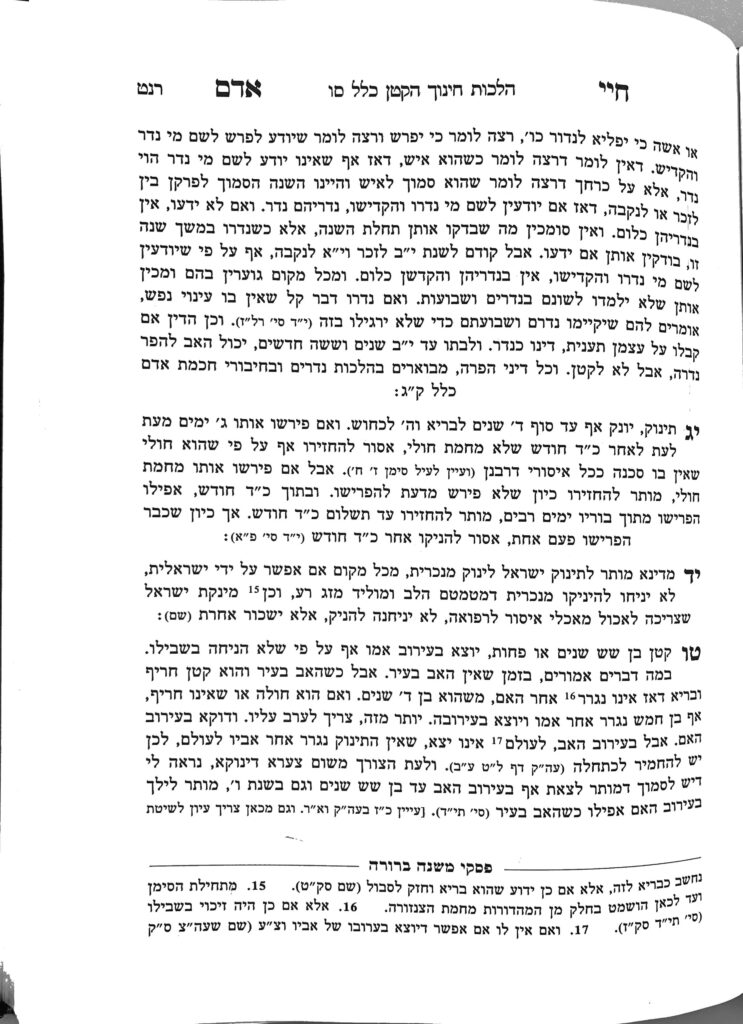We have finished siman 14, and will touch on a few additional points regarding chinuch. The Shulchan Aruch discusses the halachos of a katan in siman 343. In seif katan 3, the Mishnah Berurah writes that if a parent hears their child speaking lashon hara, they should stop the children. Similarly, if the parents hear their child fighting, lying, cursing others, the parents should stop their children. Additionally, according to the Chayei Adam that other adults are chayav to intervene when a katan is transgressing an issur deoraysa (see shiur 1285), other adults would be chayav to intervene in the above scenarios also.
The Mishnah Berurah laments that we are no longer careful to stop our children from these behaviors, to the point that only when they grow up do they learn for the first time that these behaviors are wrong. However, at that point in their lives, it is much harder for them to change, because they have gotten so used to these behaviors. These are not only part of the mussar concept of proper chinuch (i.e., an ideal for which one to strive), but are issurim deoraysa, so one must prevent their child from transgressing these issurim.
The parameters above, and as we have learned throughout the Klal, are the halachic parameters for the chiyuv chinuch. Every parent wants their child to grow up to be a talmid chacham and yarei shamayim, and they have the responsibility to do so.
A parent of a two year old boy once came to Rav Yisrael Salanter and asked him when the chiyuv chinuch starts on his child. Rav Yisroel answered that he was two years too late. In other words, a child absorbs the attitudes and actions of the parents from when they are first born. Every one of our actions is part of the process of chinuch, not just the actions performed when we are trying to train the child. A person should be aware of this reality regarding chinuch, and should strive for his actions to follow appropriately.
Siman 15 discusses the halachos of eruvei chatzeiros. During the times of the Gemara, and possibly up until recent times, eruvei chatzeiros were created by collecting food from every person within the eruv, up to 18 people. Every family would give a donation sufficient for all the members of that household. Another option is to create an eruv through zechiya, sharing a standard amount of food with everyone. (Our contemporary eruvin employ this method to create an eruv chatzeiros, usually through a box of matzah.)
The Chayei Adam writes that whether one will have to give a portion on behalf of their child will depend on the age of the child. If the child still needs his mother, his portion is subsumed under his mother. If he no longer needs his mother, he requires his own portion.
Summary
- The chiyuv chinuch extends beyond the father to other members of Klal Yisroel if the child is transgressing a mitzvas lo saasei on a deoraysa level. Thus, a child overheard saying lashon hara, fighting, lying, cursing or cursing others should be stopped by any adult member of Klal Yisroel.
- Beyond the minimum halachic requirements we have learned until now, a person must realize that every one of our actions is part of the process of chinuch, not just the actions performed when we are trying to train the child.
- In an eruv chatzeiros where food is being contributed on behalf of every individual member of the eruv, a child requires his own portion if he no longer needs his mother.



